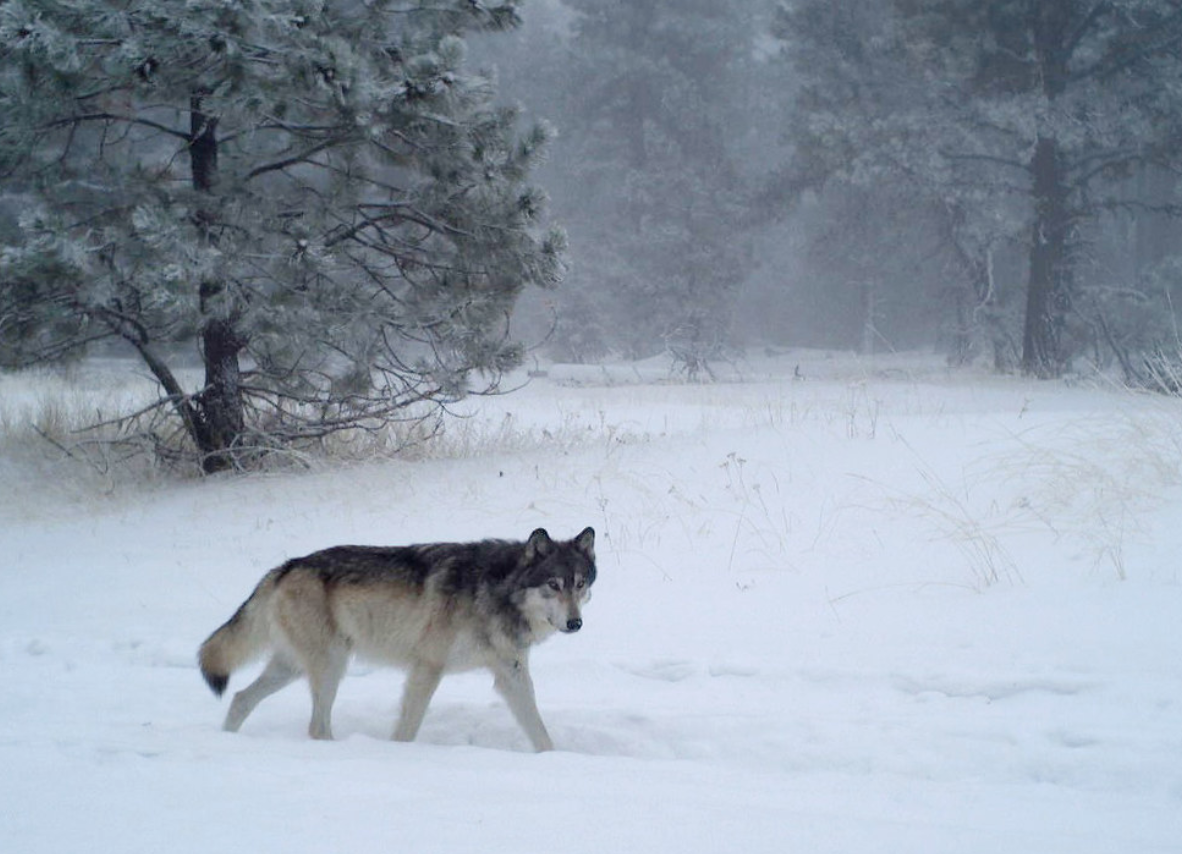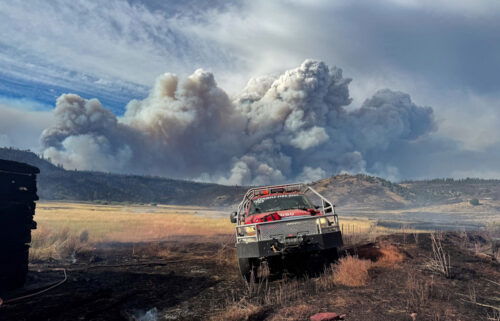OSP seeks tips in poisoning deaths of 8 Eastern Oregon wolves; groups offer $26K reward

SALEM, Ore. (KTVZ) -- Oregon State Police said Thursday they are seeking the public's assistance in locating the person or persons responsible for the poisoning of several members of the Catherine Wolf Pack and other wolves and animals in Eastern Oregon. And a group of conservation organizations are offering a $26,000 reward to find the culprits.
An OSP spokeswoman says all leads have been exhausted so they are reaching out to the public for assistance.
Wolf advocates were stunned by the news, calling the killings horrific and egregious, according to The Associated Press.
Wolves once ranged most of the U.S. but were wiped out in most places by the 1930s under government-sponsored poisoning and trapping campaigns. Wildlife advocates argue that continued protections are needed for the animals to rebound.
Here's the rest of the OSP news release, in full:
On February 9, Oregon State Police Fish and Wildlife Division Troopers received information from the Oregon Department of Fish and Wildlife regarding a possibly deceased, collared wolf. Troopers responded to the area and located five deceased wolves -- three males and two females.
It was later determined the wolves were from the Catherine Pack, with all known members present and deceased. The wolves were located southeast of Mount Harris, in Union County.
Fish and Wildlife Troopers and ODFW personnel, with the assistance of a helicopter, searched the area for anything of evidentiary value. An additional deceased magpie was also found in the vicinity of the deceased wolves.
The five wolves and magpie were collected and transported to the US Fish and Wildlife Service Forensics Lab in Ashland to determine the cause of death.
On March 11, Fish and Wildlife Troopers again received information from ODFW personnel of an additional wolf collar emitting a mortality signal in the same general location. A search of the area located a deceased female wolf, a skunk, and a magpie all very close to the scene.
All animals were collected and immediately submitted to the USFWS lab for testing. The female wolf was dispersing from the Keating Pack.
Fish and Wildlife Troopers were initially hampered in investigating the scene due to snow levels and inclement weather. Troopers continued searching over the next few weeks as snow continued to melt and located evidence of suspected poisoning. The evidence was submitted for testing and analysis.
In April, the USFWS submitted their examination reports with findings consistent with poisoning as the cause of death for all six wolves, the skunk, and two magpies. Lab results also indicated the suspected evidence confirmed a poisonous substance.
In addition, two more collared wolves were found deceased in Union County after the initial incidents. In April, a deceased adult male wolf from the Five Points Pack was located west of Elgin, and in July, a young female wolf from the Clark Creek Pack was located northeast of La Grande.
In both cases, the cause of death was not readily apparent, a necropsy and testing were conducted. Toxicology reports confirmed the presence of differing types of poison in both wolves. Based upon the type of poison and locations, it was determined the death of the young female wolf may be related to the earlier six poisonings.
Oregon State Police Fish and Wildlife Troopers have continued in their investigation in the intervening months but have exhausted leads in the case. OSP is asking any person with information related to this investigation to contact the Oregon State Police through the OSP TIP Hotline: 1-800-452-7888 or OSP (677) or TIP E-Mail: TIP@state.or.us. Please reference Case #SP21-033033.
To learn about wolves in Oregon, specifically wolf-livestock conflicts, visit https://www.dfw.state.or.us/Wolves/index.asp#livestock
Report Wildlife and Habitat Law Violators
The Oregon Hunters Association TIP reward offers preference points or cash rewards for information leading to an arrest or issuance of a citation for the unlawful take/possession or waste of Bighorn Sheep, Rocky Mountain Goat, Moose, Elk, Deer, Antelope, Bear, Cougar, Wolf, Upland Birds, Waterfowl, Furbearers, Game Fish and Shellfish. Cash rewards can also be awarded for turning in people who destroy habitat, illegally obtain licenses/tags, and for the unlawful lending/borrowing of big game tags.
Preference Point Rewards:
5 Points-Bighorn Sheep
5 Points-Rocky Mountain Goat
5 Points-Moose
5 Points-Wolf
4 Points-Elk
4 Points-Deer
4 Points-Antelope
4 Points-Bear
4 Points-Cougar
CASH REWARDS:
$1,000 Bighorn Sheep, Rocky Mountain Goat and Moose
$500 Elk, Deer and Antelope
$300 Bear, Cougar and Wolf
$300 Habitat Destruction
$200 Illegally Obtaining License/Tag(s)
$200 Unlawful Lend/Borrow Big Game Tags(s)
$100 Upland Birds and Waterfowl
$100 Furbearers
$100 Game Fish and Shellfish
News release:
$26,000 Reward Offered for Info on Fatal Poisoning of 8 Gray Wolves in Eastern Oregon
PORTLAND, Ore.— Conservation and animal protection groups are offering a combined $26,000 reward for information leading to a conviction in the deliberate poisoning and killing of eight gray wolves in eastern Oregon earlier this year.
On Feb. 9 Oregon State Police Fish and Wildlife Division Troopers found the five members of the Catherine wolf pack — three male, two female — dead at a location southeast of Mount Harris in Union County. On March 11 troopers detected a mortality signal in the same location and found a slain wolf: a radio-collared female that had dispersed from the Keating pack.
Two more collared wolves were subsequently found dead in Union County. In April an adult male wolf from the Five Points pack was discovered west of Elgin, and in July a young female wolf from the Clark Creek pack was found northeast of La Grande.
According to the Oregon State Police, toxicology reports confirmed the presence of differing types of poison in both wolves. Investigators determined the death of the young female wolf may be related to the earlier six poisonings.
“Poisoning wildlife is a profoundly dangerous and serious crime, putting imperiled species, companion animals and people all at risk,” said Bethany Cotton, conservation director for Cascadia Wildlands. “We call on those with information about this reckless killing to come forward to protect Oregon’s wildlife and our communities.”
“These despicable poisonings are a huge setback for the recovery of Oregon’s endangered wolves, and we need an all-out response from state officials,” said Sophia Ressler, a staff attorney at the Center for Biological Diversity. "Catching the culprit is critical, but Oregon also needs to think hard about what more can be done to protect these incredibly vulnerable animals. We hope anyone with info on these killings steps forward, and we hope wildlife officials see this as a wake-up call.”
“This is a cowardly and despicable act,” said Brooks Fahy, executive director of Predator Defense, an Oregon based national wildlife advocacy nonprofit. “It is absolutely critical that the perpetrator of this crime be caught and prosecuted to the full extent of the law. The Oregon State Police should aggressively pursue all leads that will help bring the individual who carried out this atrocity to justice.”
“We are devastated by the egregious illegal poisoning and killing of the Catherine Pack and members of the Keating Pack, the Five Points Pack, and the Clark Creek Pack,” said Kelly Peterson, Oregon senior state director at the Humane Society of the United States. “These eight individuals had rich social lives and families that depended on them and contributed to the health and biological diversity of our environment. Wolves are one of the most misunderstood and persecuted species in North America; yet we know that Oregon’s wolves are beloved by the majority of Oregonians, and we urge anyone with information about the person or persons responsible for this heinous crime to come forward.”
“A majority of Oregonians are disgusted by poachers and those who would indiscriminately poison and kill wildlife,” said Danielle Moser, wildlife program coordinator at Oregon Wild. “Unfortunately, there remains a persistent culture of poaching in Oregon. This culture is emboldened by politicians and interest groups that demonize imperiled wildlife like wolves and then turn the other way when laws are broken. When people are told that native wildlife should be resented and feared, it's no wonder they take matters into their own hands in the incredibly ugly fashion that we see here."
"It is tragic that we are losing so many wolves in Oregon, as wolves continue to be lethally targeted both here and nationally,” said Lizzy Pennock of WildEarth Guardians. “The loss of these wolves, in addition to extensive lethal removals at the hands of the Department this year, is a stark reminder of the need to enhance proactive nonlethal measures in wolf management to foster coexistence."
“We are furious and appalled. These poisonings are a significant blow to wolf recovery in Oregon. Such a targeted attack against these incredible creatures is unacceptable and we hope our reward will help bring the criminals who did this to justice,” said Sristi Kamal, senior northwest representative for Defenders of Wildlife.
Anyone with information about this case should contact the Oregon State Police Tip Line at (800) 452-7888 or *OSP (677) or TIP E-Mail: TIP@state.or.us. Callers may remain anonymous.
The $26,000 in combined rewards are offered by the Center for Biological Diversity, Cascadia Wildlands, Defenders of Wildlife, The Humane Society of the United States, Northeast Oregon Ecosystems, Oregon Wild, Predator Defense and WildEarth Guardians.
The Center for Biological Diversity is a national, nonprofit conservation organization with more than 1.7 million members and online activists dedicated to the protection of endangered species and wild places.



